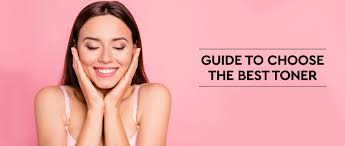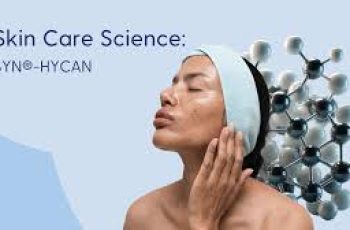
What is a facial toner? How do you choose the best toner for your skin type/skincare routine?
For radiant, healthy-looking skin, it’s not enough to just cleanse your face every day. A much-debated, yet often overlooked step in your skincare routine is using a toner.
These seemingly simple liquids look and feel like water, but for some people, they play an important role in skin health.
Read on to learn about the potential benefits of toners, the different types, and common mistakes to avoid.
The Role of Toner in Skin Care
Using a toner between cleansing and moisturizing can prepare your skin for the next steps in your skincare routine.
While cleansing removes a lot of oil or makeup, using a toner ensures that no residue is left behind.
Once your pores are adequately cleansed, your face can enjoy the benefits of subsequent products like serums, lotions, night creams, and other targeted treatments.
Toners also restore pH levels, which can be disturbed by harsh cleansing products.
Benefits of Toner
According to experts at the Cleveland Clinic, using a toner after cleansing can increase the amount of moisture in the outer layer of the skin, which can improve the absorption of other products.
Some proven benefits of toner include:
Clearer skin: Toner helps remove oil and makeup residue after cleansing.
Extra hydration: Newer generations of toners contain soothing ingredients like hyaluronic acid and niacinamide to lock in moisture in the skin.
Refine pores: By thoroughly cleansing pores, toners can visibly reduce impurities that cause them to enlarge.
Improve pH: Some toners contain acids like alpha hydroxy, beta hydroxy, lactic acid, and salicylic acid to help restore pH levels.
Different types of toners
Toners come in different formulas to suit different skin types and concerns. Older toners almost always contained alcohol, as they were primarily designed to remove impurities.
Today, alcohol-based toners are less common, although some people with oily or acne-prone skin incorporate them into their daily routine.
Alcohols often dry out the skin and strip it of its natural oils, so these toners are not recommended.
Alcohol-free toners are generally gentler and more hydrating, making them particularly suitable for dry or sensitive skin.
There are also toners that contain active ingredients like glycolic acid or antioxidants to target specific skin care concerns.
There are also hybrid toner-moisturizers. These products support the skin barrier and protect the skin from environmental influences and water loss.
Hyaluronic Acid Lotion
Hyaluronic Acid Lotion
• Locks in moisture and moisturizes the skin
• Protects, repairs, and heals the skin
• Anti-inflammatory ingredients
Regular Price $45
Add to Cart
How to Choose the Right Toner for Your Skin Type
Choosing the right facial toner for your skin type is crucial for achieving the best results. Here are some tips to help you make your choice:
Acne-Prone Skin: If you have oily or acne-prone skin, choose a toner with ingredients like salicylic acid to combat excess oil.
Keep in mind that ingredients like salicylic acid can cause dryness to the skin. So if you have dry skin, choose a gentler solution.
Facial toners with niacinamide can also help reduce acne by reducing inflammation.
Dry Skin: If you have dry skin, choose a toner with hydrating ingredients, such as hyaluronic acid, a powerful humectant that draws moisture into the skin.
Sensitive Skin: If you have sensitive skin, avoid toners with alcohol and opt for products with soothing ingredients, such as chamomile or aloe vera.
Pigmentation: Some facial toners claim to have brightening effects, such as those with antioxidants like vitamin C or retinol.
Incorporate Toner into Your Skincare Routine
Toner is a skincare product that sits between cleansing and moisturizing. After cleansing your face, apply toner with a cotton pad or gently pat it into your skin.
Follow with serum and moisturizer. Using toner twice a day, morning and night, will leave your skin refreshed, balanced, and ready for the full benefits of your other skincare products.
Also, if you’re already using skincare products with the targeted ingredients mentioned above (hyaluronic acid, niacinamide, vitamin C, or retinoids), toner isn’t necessary.
In fact, if these ingredients were used alone, they would likely have a higher concentration, as toners may be too diluted to produce noticeable results.
Foundation Skincare offers a range of dermatological products for a variety of issues, whether you’re battling acne, hyperpigmentation, dry skin, or signs of aging.
The highly concentrated products (20% Vitamin C, 10% Niacinamide, 14% Azelaic Acid) rival prescription products, but are still gentle enough for all skin types and available over the counter.
Products include:
Azelaic Acid 14% Cream: Effective for reducing acne, hyperpigmentation, and enlarged pores
Niacinamide Lotion 10%: Ideal for soothing inflamed skin, preventing breakouts, reducing hyperpigmentation, and slowing signs of aging
Hyaluronic Acid Lotion: Ideal for replenishing hydration
Vitamin C Lotion 20%: Ideal for brightening skin and reducing signs of aging
Night Cream with Granactive Retinoid 2%: Great for reducing fine lines, wrinkles, and loss of elasticity
Explore the entire range here.
Common Mistakes You Should Avoid
If you decide to use a toner, avoid the following mistakes to get the most out of the product:
Don’t use toner too often as this can cause dry skin.
Avoid using facial toners that contain alcohol if you have dry skin.
Pay attention to the ingredients in your facial toner and make sure they are suitable for your skin’s needs.
Avoid using toner on the delicate skin around your eyes, as it requires special care.
If you love using toner and look forward to making it part of your skincare routine, make sure you use a quality product that’s tailored to your skin type and individual needs.
If you’re looking for alternative ways to bridge the gap between key skincare steps like cleansing, moisturizing, and sun protection, FS Journal has more science-backed, dermatologically-informed tips.
DQH Knowledge drop: In your 20s, your skin cell turnover decreases. (Cell turnover is a key component in keeping your skin youthful.) You know what else slows down? Your collagen production. Starting in your 20s, collagen decreases by about 1 percent per year. Should you want to prevent fine lines and wrinkles, start by eliminating behaviors that contribute to premature aging. “If it’s bad for you, it’s bad for your skin,” says dermatologist Michel Somenek.
“Cigarette smoking reduces blood flow to the skin and causes premature wrinkling and a dull skin texture. Making the repeated pursed motion to inhale can also cause smoker’s lines. Alcohol and recreational drugs are toxins for the skin that damage its cellular structure and DNA,” Somenek tells us. “The faster you eliminate vices while you are young, the better chance your skin and body have to recuperate.” Also, adopting an anti-aging routine in your 20s is key. After all, the best offense is a good defense. We spoke to Somenek and experts Joshua Ross and Audrey Kunin to find out more.
Keep reading for the best anti-aging products for your 20s, according to skincare professionals.
Sunscreen
“We all know that the sun is the number one cause of skin aging and starting the prevention in your 20s is very important,” Ross says. “The majority of your sun damage won’t start to appear until you’re in your 30s, so don’t wait until you see it surface or you’ll be behind the curve. Stay ahead of it with a good-quality zinc-based sunscreen worn daily.”
Farmacy Green Defense Daily Mineral Sunscreen
An invisible sunscreen with SPF 30, plus botanical extracts meant to protect skin with tons of antioxidants. Bonus: It’s clean and fine to use under makeup.
Bareminerals Complexion Rescue™ Tinted Moisturizer Broad Spectrum SPF 30
Although we recommend you use your SPF and moisturizer separately, we also understand moments when you don’t have time or energy for that extra step. For those times, this bareMinerals moisturizer is a great thing to have on hand.
Vitamin C Serum
“A great introduction to anti-aging is to start with a vitamin C serum in your morning skincare routine,” Ross says. “It’s a powerful antioxidant that will neutralize free radicals and brighten the skin.” He adds that it’s a great way to counteract the effects of the sun’s harmful rays, which, as previously mentioned, are among the biggest causes of premature aging.
Drunk Elephant C-Firma™ Vitamin C Day Serum
The Drunk Elephant C-Firma is a lightweight serum that promises to give skin a glow by combining the brightening powers of vitamin C with ferulic acid, l-ascorbic acid, and vitamin E. The included sodium hyaluronate is meant to replace hydration loss, so you shouldn’t have to deal with any irritation.
Sunday Riley C.E.O. Rapid Flash Brightening Serum
This potent serum is jam-packed with vitamin C (15 percent, to be exact), which means it’s a potential superstar at both brightening skin and dousing it in antioxidants.
Peptides
Using peptides on your skin has many benefits, says Somenek. “The skin barrier is what defends the body against pollution, UV rays, bacteria, and toxins. It can be damaged by several everyday factors. Using topical peptides aids in building a stronger barrier,” he says. “Peptides comprise elastic fibers, which are a type of protein. These fibers help to make skin appear taut and firm. Peptides can also help repair damaged skin, relieve inflammation, and even out skin tone. Some peptides can kill acne-causing bacteria that is common in 20-somethings.”
Kunin agrees, saying, “Peptides are an excellent entry point for supporting collagen.” She recommends looking for face and eye treatments that contain these collagen-boosting powerhouses.
Charlotte Tilbury Magic Eye Rescue Cream
This Charlotte Tilbury super-emollient eye cream has a base of coconut oil and shea butter (read: it’s incredibly hydrating). Botanicals plus peptides are meant to help reduce dark circles and boost collagen, respectively.
This creamy moisturizer serves up potent collagen-boosting peptides and pycnogenol, and antioxidant-rich vitamin C. “Instead of sitting on top of the skin, peptides penetrate the outer layer so they go deep. The ‘signals’ they send tell the cells to produce elastin and collagen, which are needed for youthful-looking skin,” explains Somenek.
At-Home Peel Pads
Remember that skin cell turnover fiasco we talked about earlier? One way to help support it is by exfoliating. “Exfoliation is important to help keep skin fresh and luminous,” Kunin says. She recommends using at-home peel pads as an easy and effective way to exfoliate.
“The goal in your 20s is to fight the slowing pace of cell turnover. It is wise to use products that gently exfoliate, yet still remove oil and other impurities. Products that have Alpha Hydroxy Acids (AHA) or Beta Hydroxy Acids (BHA) are a good choice.”
According to Somenek, you should only exfoliate two to three times a week. “People of all ages are guilty of over-exfoliating and that can be too much of a good thing,” he says.
Dermadoctor Kakadu C Intensive Vitamin C Peel Pad
A few swipes of this Derma Doctor powerful peel pad promise to leave your skin glowing and smooth, thanks to the seven (yes, seven) types of chemical exfoliants, including AHA and BHA. It also contains vitamin C via Kakadu plum extract for added brightening and antioxidant protection.
KEY INGREDIENTS Kakadu plum extract is sourced from the Kakadu plum, a fruit grown in northern Australia. It contains vitamin C, which restores the skin’s natural barrier, increases collagen production, and soothes irritation.
Dr. Dennis Gross Skincare Alpha Beta® Universal Daily Peel Pads
These are the gold standard of peel pads, with a cult following and over 900 five-star reviews on Sephora. They’re easy to use and contain a blend of anti-aging exfoliating acids.
Emollient Night Cream
“In your 20s, you need to start upping the hydration in your skincare routine. You may have been cautious of over-moisturizing because of acne in your teens, but as you enter your 20s, your skin transitions and becomes drier,” Ross says. “I recommend an emollient night cream added into your evening skincare regimen.”
“Twenty-somethings need to make sure that they are not using creams that will clog their pores and cause excess oil production,” says Somenek. Opt for non-comedogenic products.
Cerave Skin Renewing Night Cream
One great choice is the CeraVe Skin Renewing Night Cream, which is a non-comedogenic night cream that leaves skin soft and glowy. It combines the moisturizing powers of ceramides and hyaluronic acid.
RoC Retinol Correxion Max Hydration Creme
“The best night cream ingredients contain retinol, benzoyl peroxide, and/or salicylic acid or hyaluronic acid. The goal is to moisturize, yet remove excess oil,” says Somenek. This Roc Retinol Correxion cream fits the bill as it contains both hyaluronic acid and retinol so it promises to moisturize while also being non-comedogenic.



